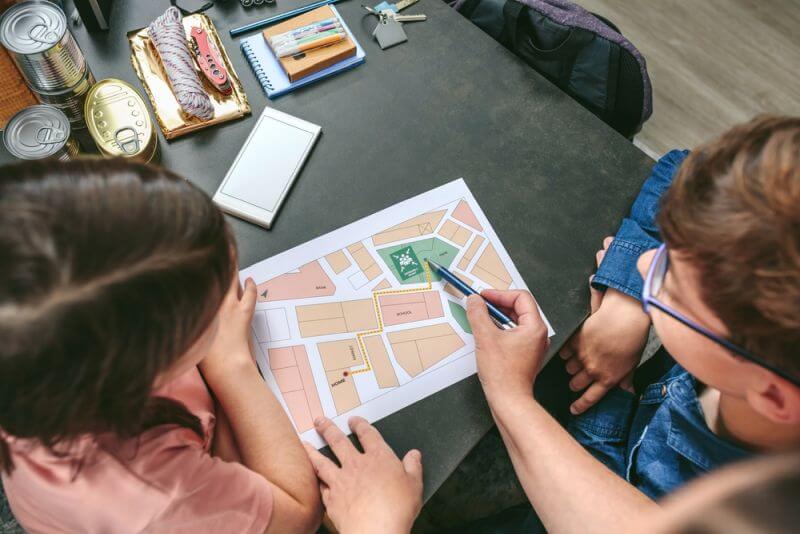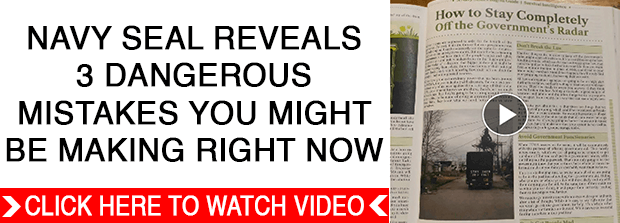Introspection is one of the healthiest mental exercises we can undertake. Unfortunately, it is much less common than the physical exercise that many partake of, trying to keep their bodies in shape. While the adage of “no pain, no gain” applies equally to introspection as it does to making our bodies work hard, we all tend to find it much easier to suffer the kind of pain that exercise causes in our flesh, then the deeper pain that introspection causes to our souls.
People can go their whole lives, without taking the time for a good look at themselves. It’s actually rather easy to do. All any of us have to do, to keep ourselves from looking inward, is to convince ourselves that all our problems are coming from without. Everything, regardless of what it is, is someone else’s fault; and since it’s someone else’s fault, there’s no reason to bother looking at ourselves. This happens equally to businessmen, criminals and yes… even preppers.
I’ll have to be honest here; it’s not all our fault. I know that sounds kind of crazy. After all, I’ve just said that we’re bad at looking at ourselves and instead point the finger at everyone else. But we live in a society that teaches us to do just that. As long as we believe what society tells us, we can and will avoid looking within. Oops.
Here’s the problem though. Being an effective prepper requires constantly reanalyzing our plans, looking for errors and ways that we can improve them. Failure to take that step, no matter how hard it is, sets us up for failure. That’s a failure none of us can afford, as it could very well mean our lives and the lives of our families. No, that’s too big a price to pay.
Ok, so what should we do about that?
As preppers, we need to constantly be reviewing our survival plans, seeking out areas where our plans need to be changed. Those changes might be due to circumstance changing, risks changing, our family changing, our financial circumstances changing, or even our knowledge changing. Any of these alone is enough to cause our original thinking to be faulty. Put them together and chances are that we’re all making some grave mistakes.
So, let’s take a look at some potential areas where our thinking could be wrong.
Just Prepping for TEOTWAWKI Events
It’s easy to get caught up in the excitement of major disasters, focusing on them. After all, the big disasters are “sexy,” giving us and our prepping activities legitimacy of a sort. We can look down our noses at those who don’t prep, knowing that they will likely die when an EMP takes down the grid.
Focusing on TEOTWAWKI events can cause us to build our plans around some form of urban homesteading. While there’s nothing wrong with that, it isn’t a complete answer. That urban homestead isn’t going to keep you alive if your town is flooded or burns to the ground. That’s why I call planning for those major disasters a “framework” – you’ve got to add to them, ensuring that you’re covering all the other sorts of disasters that are likely to come your way.
The really good thing about preparing for a TEOTWAWKI event is that it causes you to stockpile heavily, making sure you have enough food, seed, and other supplies to keep your family alive. But all of that is usually at your home; not where it will do you any good if you’re faced by the flooding or fire I mentioned. We need a balance between the two.
Tunnel Vision
Tunnel vision can take on a number of different forms. The most common is to become so focused on one type of potential disaster, that we forget about others. This doesn’t just mean being focused on the possibility of a TEOTWAWKI event. It can also mean focusing on the more common natural disasters as well. For example, people in Florida can become so focused on the risk of hurricane, that they forget to prepare for the possibility of a wildfire.
But that’s not the only way we can get tunnel vision. Another manifestation of this is in focusing on one area of prepping, to the point of forgetting other areas which are just as important. This is common for new preppers, who mostly focus on stockpiling food. But it can be pretty bad when someone has been prepping for five years and haven’t grown beyond that point. Prepping is all-inclusive, and we need to make sure that we live it out that way.
No Practical Bug Out Plan
A common area for people to forget is creating a practical bug out plan. By practical, I mean that not only can they get out of town; but they have someplace to go to and the necessary equipment and supplies to survive for an extended period of time once they get there.
Most of us focus on prepping to bug in and there’s nothing wrong with that. But we’ve had several examples of disasters where people couldn’t survive if they bugged in. They had to be ready to bug out. Unfortunately, in many of those cases, other than having a bug out bag, the preppers in the area weren’t any better off than anyone else, not having a prepared destination, with the food, water, supplies and equipment that they would need to survive at least until they could safely go back home.
No Practical Defense Plan
Another area where many preppers are seriously lacking is in their defensive plan. Actually, I find that the preppers whom I’ve met fall into two distinct camps when it comes to this. Most think that just having guns and ammo is enough. They can do a Rambo and save the day, when necessary. The other group goes overboard on defensive planning, to the point where they don’t put enough effort into other important areas.
Defensive planning and preparation is critical. Everything else we do to survive will come to naught, if someone manages to kill us. We need the necessary guns, ammunition and skills to fight off any attack. But we also need to have a defensive team. That’s one of the most important reasons to join or create a survival team. You’re much more likely to fight off any attackers together, rather than trying to play Rambo.
The challenge is figuring out how to do that. Unless your survival team lives in the same neighborhood or your team all moves into one family’s home during a crisis, you’ll probably be scattered all over the place. What they means is that you really won’t have a survival team. Even worse, you won’t have a defensive team.
One alternative is to be prepared to turn your neighborhood into a defensive team. That’s easier to do if you live in a state like Texas, where a lot of people have guns. Gathering together, after the disaster hits, and developing a defensive strategy is easier when everyone has guns and knows how to use them. When they don’t, you’ll need to supply the guns, ammo and training yourself. They don’t need to be expensive; 22LR rifles will work better than nothing. But they have to have something more than rocks and sticks to use.
Ineffective Long-Term Survival Plans
There’s no question about it; long-term survival planning is difficult. There’s just no way that any of us can truly see what the future will hold. Yet we somehow have to plan for it, especially for the worst that the future can throw at us. If the power grid goes down, as we all fear, then just exactly what will we need to have, in order to survive? We think we know… but do we really?
I’ve spent years thinking about how to survive through any given situation, including those long-term survival scenarios. Even so, I’m not 100% sure that I’m ready. Ther are just too many contingencies to think of and my wife and I aren’t getting any younger.
The sad thing is that we won’t really know if our survival plans are effective or not, until we have to put them into practice. By then, it will be too late. We will either have done good enough; or we’re going to have a hard time surviving.
About the best we can do is to constantly strive to learn more, while constantly reviewing our plans in the light of every new thing we learn. Never assume that your plans are perfect. Rather, force yourself to continue seeking out the holes in your plans and finding ways to fill them. Likewise, keep seeking out holes in your knowledge and working to plug those holes as well. When it all comes down to it, it is your knowledge that will do more to help you survive.
Not Thinking Large for Food Production
I keep beating on this drum; but that’s because it’s an important one. The drum I’m referring to is the one of increasing your food production. No matter how much food you’re currently raising, unless you’re living off it and still having food to sell, you’re not raising enough.
Planting a vegetable garden and canning your produce has become a standard part of prepping. That’s good. But what’s not good is the size of most of those gardens. Granted, you might not want to turn your entire backyard into a garden right now; but you’d better have a plan, as well as the necessary supplies, so that you can do so when the time comes. Otherwise, you’re going to get mighty hungry.
Not Recognizing Disasters when they Come
Finally, I’d like to look back a few years and review one important point about our latest TEOTWAWKI event. I’m talking, of course, about the COVID pandemic. I don’t care if you believe it was a real disaster or you think it was a government hoax. It really doesn’t matter. I’m more concerned with how you and I reacted to it. Did we treat it like a disaster or did we suffer through it, like everyone else, trying to find a package of toilet paper to buy?
Not all disasters look like disasters, especially those that don’t hit quickly. Few of us recognized COVID as a disaster, even after the government started shutting businesses down. Will you and I do any better in recognizing a financial collapse? A flood looks like a flood; but what does a financial collapse look like?
The point is, we are busy preparing for those disasters, even if they are hard to recognize. So, when we lose our jobs or the grocery store shelves empty out, lets treat it like the disaster it is. Let’s not make the mistake again of standing in line for toilet paper, when we’ve got 20 cases of it in the attic. If you can’t get it, it’s time to dig into the stockpile.
























































































“Plan” is used 20 times in this article. Since we are evaluating what we will do when “something” unknown (do you claim to know the future? Really?) happens, we should evaluate our thinking that “plans” should be different for various contingencies.
Excellent information. I also have a few different prepping books, read them more than once, and will read them again. Thank you for the information. Be well and safe.